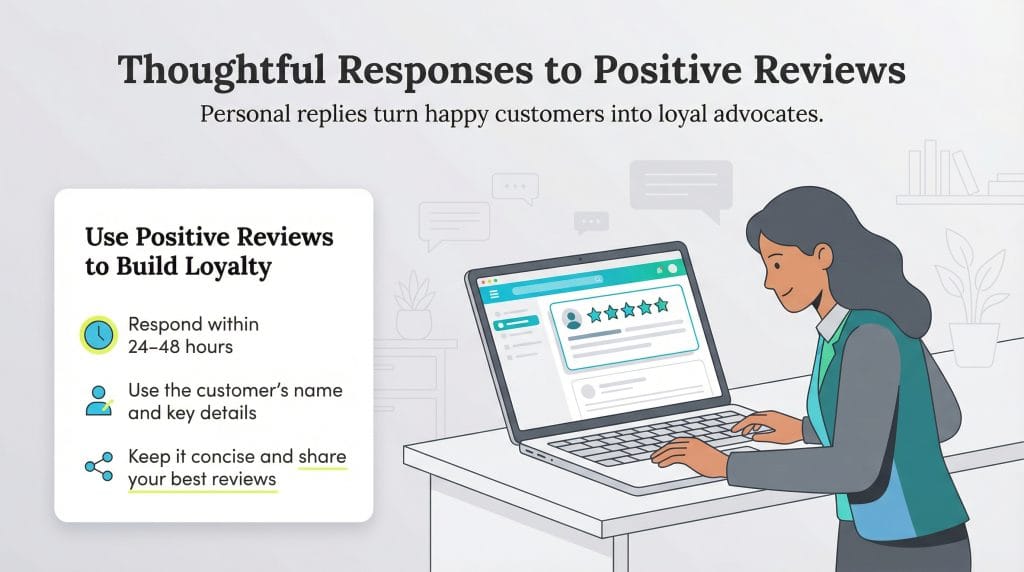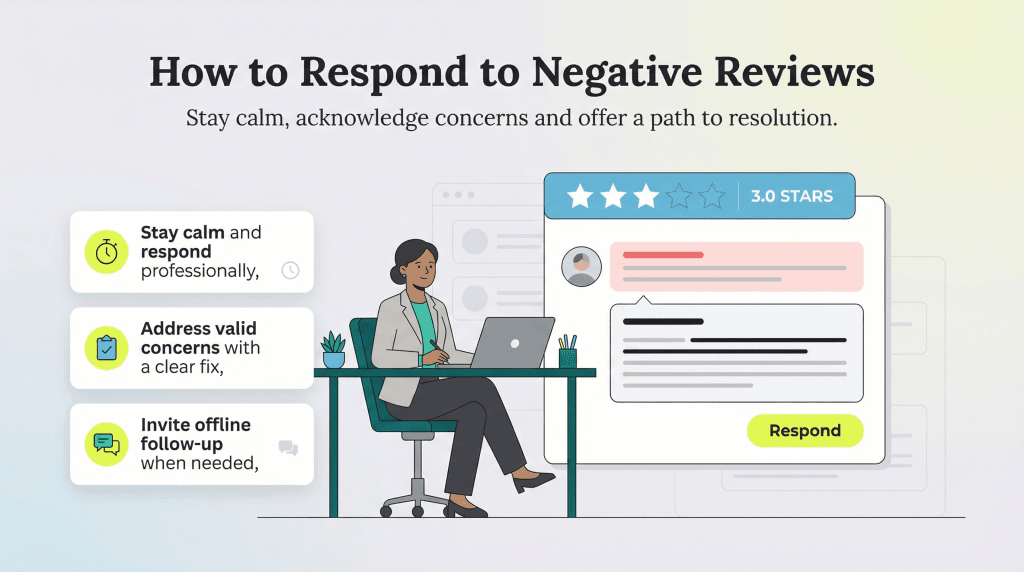Online reviews have become a powerful tool for consumers seeking advice on purchases and determining if a company is reputable. According to BrightLocal’s 2025 Local Consumer Review Survey, 97 percent of consumers read online reviews when considering a purchase from a local business, with 74 percent consulting two or more reviews before deciding.
However, many businesses treat online reviews as static information and don’t respond to them. This is a wasted opportunity. Responding to online reviews of your business or products — both good and bad — is a great way to share your company’s perspective. You can also demonstrate how much you care about current and future customers. We’ll explore why businesses should respond to all online reviews and share examples of how to react to positive and negative online customer feedback.
Editor’s note: Looking for the right online reputation management service for your business? Fill out the below questionnaire to have our vendor partners contact you about your needs.
Why you should respond to all online reviews
Here are five reasons why businesses should respond to every customer review:
1. Responding to every review shows you care about every customer.
When you respond to every online review someone posts, you show the world that every customer is vitally important, whether they’re complaining or complimenting your business.
When you get a negative review, you’ll usually have one of two instincts:
- Respond to try to mitigate the damage, or
- Ignore it because it’s unpleasant and you don’t want to make it worse.
Responding is the correct instinct. In fact, according to the BrightLocal survey cited above, 89 percent of consumers are more likely to buy from a business that responds to all reviews, both positive and negative. Response time matters, too: 20 percent say a business should reply on the same day or the next, while 63 percent expect a response within a week.
Responding to negative reviews gives you a chance to rectify the situation and possibly salvage the customer, earning repeat business and customer loyalty. It also shows prospects that you address problems head-on, which is a sign that you’re professional and care about your customers.
When you get a positive review, you’ll likely be pleased but may not feel the need to respond since there’s no issue to resolve. However, responding to positive reviews is worthwhile for several reasons:
- Building stronger connections: You can reinforce your relationship with that customer and express appreciation for their feedback and business. Responding to a positive review is another opportunity to foster loyalty and repeat purchases.
- Demonstrating exceptional service: Prospects will see that you maintain a customer delight standard of service. They’ll observe your exchanges with happy customers and know you’ll value their business, too.
To help
generate good reviews, ask satisfied customers to post one while the experience is still fresh. You can also encourage reviews through email surveys and social media.
2. Responding to online reviews increases your customers’ lifetime value.
Responding to online reviews is a great way to boost customer retention. When you reply to customer reviews, you have a golden opportunity to market to existing customers.
The review platform will likely notify the customer when you respond. Happy clients will feel appreciated and will be more likely to continue buying from your business. Unhappy clients may feel heard and gain a satisfactory resolution to their problems.
Many business owners focus too heavily on customer acquisition and overlook retention opportunities. Often-cited Bain & Company research shows that acquiring a new customer can cost five to 25 times more than retaining an existing one. What’s more, returning customers spend up to 67 percent more than new ones.
Expressing your gratitude publicly via an online review response shows customers how much you value them, making them more inclined to continue the relationship and refer new customers.
3. Responding to online reviews enhances your SEO efforts.
Every customer review — positive or negative — is an opportunity to build your SEO strategy. Search engines like Google, Bing and Yahoo crawl the internet to find new information and provide users with the most recent and relevant content. When you respond to each customer review, you can add context about your customers’ experiences with your business.
Let’s say you run a dental practice in Austin, and a satisfied patient just posted an enthusiastic review online. You could respond:
“Thank you for the wonderful review! We’re committed to providing the highest quality dental care in Austin. I’m thrilled you had such a positive experience with our team. If you ever need anything or have questions about your treatment plan, please call our Texas office anytime. We also offer 24/7 emergency dental services for our patients.”
Notice how the keywords “dental care,” “Austin” and “Texas” are naturally integrated into the reply. This additional relevant content can enhance the review page’s SEO value, especially for your Google local business listing. Google specifically notes in its help documentation that reviews can improve your listing’s visibility in search results. Plus, BrightLocal’s 2025 Local Consumer Review Survey found that 92 percent of consumers say keyword filters are helpful. In other words, using natural, relevant keywords makes it easier for people to find your business when searching online.
Don’t overdo it with the keywords in your replies, though. Otherwise, Google and other search engines may penalize your listing. You could offend your customers or patients if they think your response isn’t authentic. Remember, these responses are public for everyone to see. The good news is you can add to, edit or update your replies anytime.
4. Responding to online reviews protects your business’s reputation.
When you fail to implement online reputation management, you leave yourself vulnerable to attack. All it takes is one or two bad reviews to tarnish your business. However, if you actively market your brand and request online reviews, you can drown a few negative reviews in a sea of positive ones. All this work serves to potentially strengthen your company’s reputation.
Today’s consumers understand that businesses can’t please 100 percent of the people 100 percent of the time. Your competition likely also has a negative review or two. The key is having dozens or hundreds of positive reviews outweighing the negative ones. Combining positive reviews with personalized responses to all your reviews protects your brand reputation.
When people see a business actively responding to reviews, it signals transparency and trustworthiness. According to Birdeye’s 2025 State of Online Reviews report, 73 percent of businesses now respond to online reviews, a rise of 15 percent since 2023. It’s a clear sign that companies understand how much thoughtful engagement helps protect their brand reputation and strengthen customer trust.
Online reviews
build trust with e-commerce customers. A mix of positive and negative reviews with an average rating between 4.2 and 4.5 stars produces the best results. If all reviews are 5 stars, prospects may suspect they're bogus.
5. Responding to online reviews attracts new customers who post reviews.
Trust drives discovery. According to Edelman’s 2025 Brand Trust Report, 80 percent of consumers trust “people like me,” and 68 percent trust online reviews as credible sources of information. That makes customer feedback one of the most persuasive marketing tools your business has.
When prospects see a steady stream of authentic reviews and thoughtful responses from your business, they perceive your brand as transparent, engaged and trustworthy. And this doesn’t just help your reputation: Reviews directly affect buying decisions. Research from the Medill Spiegel Research Center at Northwestern University found that the purchase likelihood for a product with five reviews is 270 percent higher than for a product with none.
BrightLocal’s survey adds another layer: 96 percent of consumers say they’re open to writing a business review, and nearly a third did so in the past year. That openness, combined with the fact that people are more likely to trust and choose businesses that respond to reviews, shows how engagement keeps the feedback cycle alive.
In other words, the more your business participates in the conversation by responding, thanking customers and addressing concerns, the more visible, credible and approachable it becomes. New customers discover your business through that interaction and are often motivated to share their own experiences, continuing the cycle of trust and growth.
Reviews aren't the only valuable form of
user-generated content (UGC). Other elements of your UGC strategy can include social media posts, peer reviews, testimonials, video content and blog posts.
How to respond to positive reviews
Avoid generic responses like “Thanks!” or “We appreciate you!” when replying to positive online reviews. Instead, create a sincere, meaningful reply to show customers how much you appreciate them. The time you invest in writing thoughtful review responses will yield a positive digital marketing ROI that includes loyal customers and repeat business.
When responding to a positive review, customize the following steps to your company’s personality and brand:
- Respond within 24 to 48 hours. A response to a positive review will appear more meaningful and genuine if you deliver it quickly. You don’t have to respond mere minutes after the review is published, but don’t wait more than two days.
- Address reviewers by name. When Sarah H. leaves a positive review, don’t just start your reply with “Thanks for your review!” Say, “Hi Sarah!”
- Continue with gratitude. After addressing the reviewer by name, move on to a simple thank-you: “Hi Sarah! Thanks so much for your enthusiastic review.”
- Acknowledge key points. If Sarah’s review mentions your accounting firm’s thorough tax-preparation tips, call that out. You can usually highlight the reviewer’s positive feedback in just one sentence.
- Consider personalized incentives. While optional, offering discounts or inviting reviewers to join your loyalty program can encourage repeat business. If you include these offers, do so near the end of your message.
- Keep responses concise — between 75 and 150 words. Positive review responses don’t need to be long. Be genuine and end with a simple thank-you or note of appreciation. Don’t forget to include your name.
- Share your positive reviews. After responding to a positive review, share it on your company’s social media feeds. You can also add positive reviews to your website’s testimonials page.
Example response to a positive review
Keeping the above tips in mind, the following is an example of an appropriate response to a positive review:
Hi, Sarah! Thanks so much for your enthusiastic review. We’re really happy to see that our thorough tax preparation tips and advice have made a difference for you. Feel free to remind us of this review the next time you use our services for 20% off! Thanks again for choosing us. — [Your name]
Reputation management services can help you
manage your online reputation, generate positive content via blog and social media posts, and cultivate positive online reviews.
How to respond to negative reviews
No matter how hard you try to satisfy your customers, your business may eventually face a negative online review. When this happens, take the time to craft a thoughtful, measured response rather than reacting emotionally. It helps to establish a clear review-response process with your team before replying. The last thing you want to do is respond while upset or defensive.
Negative reviews can be more complex than positive ones. Sometimes the complaint is legitimate. Other times, the customer may be unreasonable.
- When addressing valid concerns: If your business made a mistake, acknowledge it and make it clear that you’re sorry. Explain that the issue doesn’t align with your usual high standards for quality, customer service or delivery. Offer a clear path to resolution — whether that’s a refund, replacement or direct follow-up from management.
- When handling difficult situations: Some customers may exaggerate or post unfair reviews to get free products or extra attention. In these cases, reply politely and professionally without compromising your integrity. Let them know you’re sorry they had a negative experience and, if appropriate, invite them to continue the conversation privately to resolve the issue.
Remember: Your response to a negative review isn’t just for the original poster — it’s also read by potential customers evaluating your business. A professional, empathetic reply shows that you value feedback, care about your reputation and are committed to customer satisfaction.
Example responses to negative reviews
Here’s an example of responding to a negative review after your company made a mistake:
Hi, Bob. I’m so sorry you felt as if our customer service representative was rude and unhelpful. We appreciate your bringing this matter to our attention so we can take appropriate action. This sort of behavior is not typical, nor does it conform to our high standards for customer care. To make things right, please call 888-555-1000 and ask for Fran, our vice president of customer service, who will work to resolve your issue.
Here’s an example of responding to a negative review from an unreasonable customer:
Hi, Tom. Thank you for letting us know that you were disappointed with the food on your last visit. We’re so sorry your meal did not match your expectations. The beef stew is a popular dish in our restaurant, but because it’s made with Guinness, it may not be to everyone’s taste. We hope you will visit us again and order something else, like our award-winning shepherd’s pie or fish ‘n chips.





